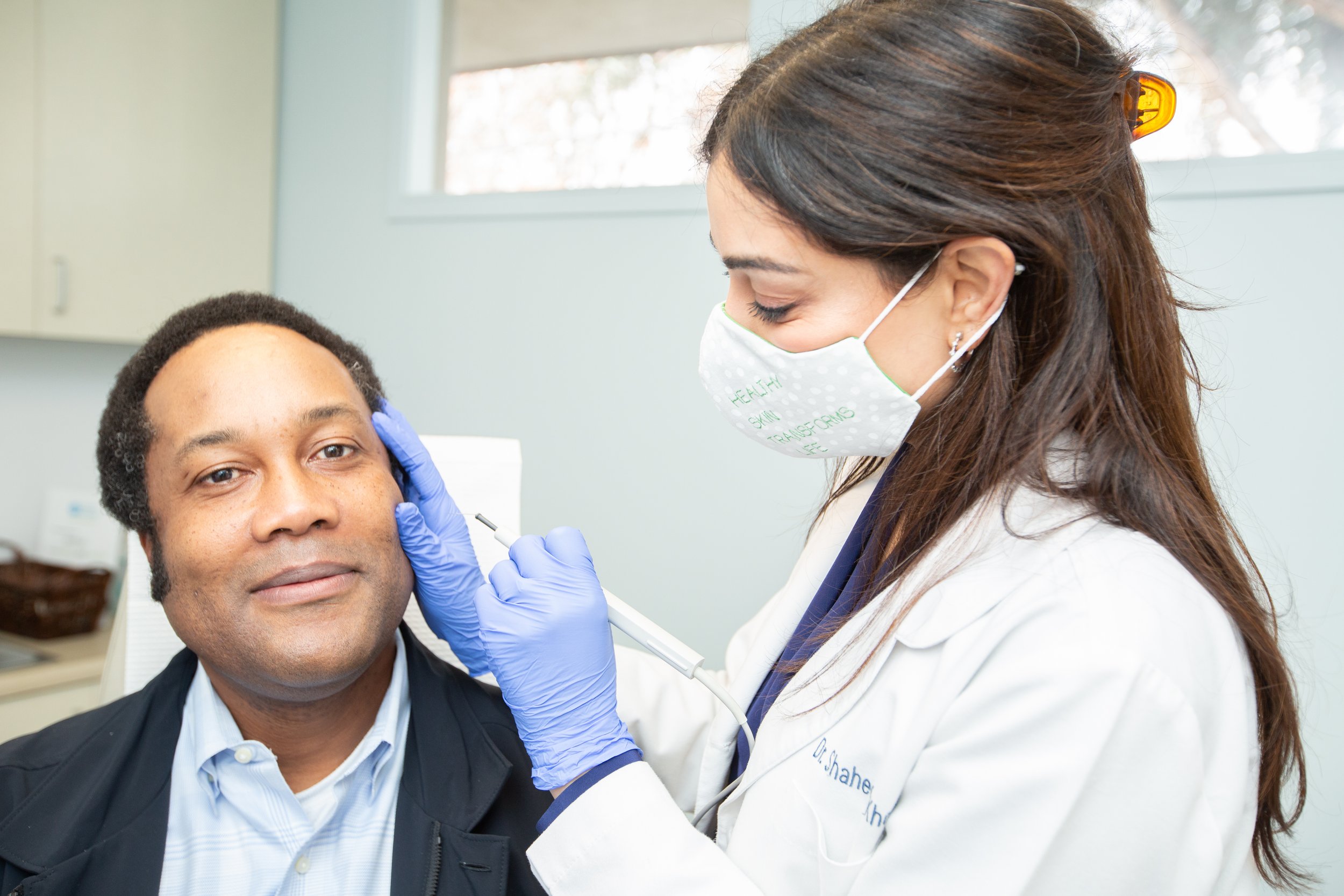
Healthy Skin Transforms Life
Medical Dermatology in the silicon valley
Treating internal health problems causing skin symptoms
Dermatology is an area of medicine that focuses on health issues affecting the skin, hair, nails, and mucous membranes.
The skin is the largest organ of the body. It is also the first line of defense against pathogens and injury, and it can be a good indicator of overall health. Medical Dermatology treats various internal health problems that can cause skin symptoms.
Insurance plans accepted:
Insurance billed through Brown & Toland - Blue Shield, UHC, UHC Oxford, Aetna, Cigna, Healthnet & Sutter Select.
Brown & Toland HMO
Sutter Pacific HMO
Hills Physician HMO
Meritain
Medicare
Blue Cross
UMR
Blue Shield Federal
“I came to see Dr. Khosla at the Menlo location for an evaluation of sun spots and light scarring I have post-acne. Previously I’ve had electro-cautery to remove targeted spots but Dr. Khosla recommended the CO2 laser procedure so I tried it! She and her staff always make me feel welcome and comfortable, even providing hairties since i forgot mine! I was fully numbed and Dr. Khosla was efficient- before I knew it, we were all done, and I had a cup of tea in my hand from the office tea bar. I have trusted Dr. Khosla with my skin care for many years now as she provides excellent advice and understands how to work with darker South Asian skin. I look forward to seeing how I look after I’m healed from this treatment :) highly recommend!”
Acne
Acne is a skin condition that occurs when oil and dead skin cells clog hair follicles. Acne has a range of causes that can lead to different types of pimples. Some people experience scarring, low self-esteem, and other complications. Treatment for acne includes topical retinoids, oral antibiotics, hormone regulating medication and laser treatments.
Dermatitis and eczema
Dermatitis is inflammation of the skin, and it typically leads to swelling with an itchy rash. There are various forms, including atopic dermatitis, which is the most common type of eczema. Atopic dermatitis or eczema is a chronic inflammatory skin disease. It is characterized by itching, scratching and dry, scaly, often crusted areas of skin. Eczema is treated with moisturizers, good skin care, and prescription topical steroids. Depending on the area affected, the strength of the steroid is adjusted. Hand eczema usually requires stronger doses of topical steroids.
Fungal infections
These are common and sometimes involve the skin, nails, and hair. A group of yeasts called Candida can cause a wide range of fungal infections, including oral thrush, ringworm, athlete’s foot, and balanitis. Treatment includes topical and oral anti-fungal medications.
Hair loss
About 80 million people in the U.S. have hereditary hair loss. A range of health issues can also cause hair loss, including nutritional deficiency, autoimmune disorders, and hormonal changes. Hair loss is treated by identifying the underlying cause, correcting any lab abnormalities, and replenishing nutrients with supplements. Platelet rich plasma injections also help with certain types of hair loss in both men and women.
Warts
These are contagious, benign skin growths that appear when a virus has infected the top layer of skin. A dermatologist can use a variety of treatments to remove persistent warts such as liquid nitrogen, surgical excision and laser treatments.
Nail problems
Dermatologists also treat health issues that damage the skin around and under the nails. Ingrown nails, fungal infections, and various other conditions can cause this damage.
Vitiligo
This involves the skin’s losing melanin, a pigment. As a result, some patches of skin are lighter in color than others. Vitiligo is thought to be a systemic autoimmune disorder where immune cells attack pigment-making cells (melanocytes) in the skin. Treatment consists of topical steroids, light therapy, and specific lasers.
Psoriasis
This chronic autoimmune disorder speeds up the growth of skin cells, resulting in patches of skin that may be thick, red, purple, or silvery and scaly. There are several types of psoriasis. Psoriasis is treated with topical steroids, topical retinoids, light therapy, and sometimes biologics, which are injected every three to four months.
Rosacea
Rosacea is a chronic rash involving the central face that most often starts between the age of 30 and 60 years. It is common in those with fair skin and blue eyes. Rosacea causes redness in the face, sometimes with pus-filled bumps, visible blood vessels, and swelling of the eyelids. Symptoms can spread from the nose and cheeks to the forehead, chin, ears, chest, and back. Rosacea is treated with topical creams, antibiotics, and laser treatments.
Shingles, or herpes zoster
This viral infection causes a rash that may be painful. It may clear in a few weeks without treatment, but medical intervention can help speed recovery and prevent complications, which can be severe. Anti-virals are prescribed to shorten the course of the outbreak, and pain medication is sometimes needed.
Skin cancer
About 1 in 5 people in the U.S. develop a type of skin cancer by age 70. The most common forms are basal cell carcinoma, melanoma, and squamous cell carcinoma. Depending on the type of skin cancer, treatment ranges from topical liquid nitrogen, topical chemotherapy, and often times surgical excision is needed.
“What I love most about Pacific Coast Dermatology is their holistic approach to healing. In addition to caring for the medical and cosmetic needs of patients, Dr. Khosla is not your average physician—she is a healer.
Amidst a serene environment and friendly, efficient staff; it’s always a pleasant visit!”













